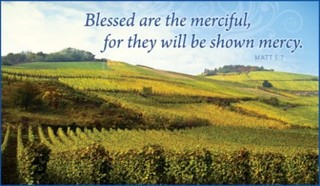
- Recent Translations
- All Translations
Matteo 5:21
Share
Settings
Matteo 5:21 Meaning and Commentary
Ye have heard
That is, from the Scriptures being read to them, and the explanations of the ancients, which were called (atemv) , "hearing", being read in the schools, and heard by the scholars F15; so that to "hear", was along with the recital of the text, to receive by tradition, the sense the elders had given of it: of this kind is the instance produced by Christ. Thus Onkelos, and Jonathan ben Uzziel, render the phrase, "him shall ye hear", in ( Deuteronomy 18:15 ) by (Nylbqt hynm) , "from him shall ye receive"; so those phrases F16, (hewmvh ypm wdml) , "they learn from hearing", or by report from others; and (hewmvh ypm wrma) "they speak from hearing", or from what they have heard, are often used for receiving and reporting things as they have them by tradition. That "it was said", or "it hath been said"; this is also a Talmudic form of expression; often is this phrase to be met with in the Talmud, (rmatya) , "it has been said" F17; that is, by the ancient doctors, as here, "by them of old time", or "to the ancients", (Mynwmdql) so in Munster's Hebrew Gospel; not to the Israelites in the time of Moses, but to the ancestors of the Jews, since the times of Ezra; by the elders, who were contemporary with them; and who by their false glosses corrupted the law, when they recited any part of it to the people; or "by the ancients", the ancient doctors and commentators, which preceded the times of Christ, whom the Jews often call (wnynwmdq) , "our ancients" {r}. Now, upon that law, "thou shalt not kill", they put this gloss, or added this by way of interpretation,
and whosoever shall kill, shall be in danger of the judgment;
which they understood only of actual murder, either committed in their own persons, or by the means of others. Their rules for the judgment of such persons were these;
``everyone that kills his neighbour with his hand; as if he strikes him with a sword, or with a stone that kills him; or strangles him till he die; or burns him in fire; seeing he kills him in any manner, in his own person, lo! such an one must be put to death (Nyd tybb) , "by the house of judgment", or the sanhedrim F19.''Not that which consisted of three persons only, but either that which consisted of twenty three, or the supreme one, which was made up of seventy one; which two last had only power of judging capital offences. Again,
``if a man hires a murderer to kill his neighbour, or sends his servants, and they kill him, or binds him, and leaves him before a lion, or the like, and the beast kills him, everyone of these is a shedder of blood; and the sin of slaughter is in his hand; and he is guilty of death by the hand of heaven, i.e. God; but he is not to be put to death by the house of judgment, or the sanhedrim F20.''A little after, it is said, "their judgment" is delivered to heaven, i.e. to God; and this seems to be the sense of the word "judgment" here, namely, the judgment of God, or death by the hand of God; since it is manifestly distinguished from the council, or sanhedrim, in the next "verse". The phrase,
in danger of judgment,
is the same with F21 (Nyd byyx) , "guilty of judgment", or deserves condemnation.
F15 Vid. Buxtorf. Lex. Rabbin, fol. 2453.
F16 Maimon. Hilch. Issure Mizbeach, c. 1. sect. 2, 4, 5, 7, 10. & passim, & T. Bab. Sanhedrim, fol. 88. 1.
F17 Vid. Edzardi Not. in Avoda Zara, c. 2. p. 284.
F18 Vid. R. Aben Ezra in Exod. xxi. 17. & in Isa. lii. 13. & lxvi. 24.
F19 Maimon. Hilch. Rotseach, c. 2. sect. 1.
F20 Maimon. Hilch. Rotseach, c. 2. sect. 2.
F21 In Targ. in 2 Chron. xix. 10.

